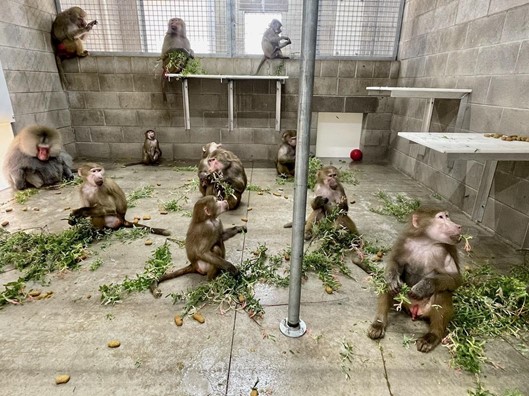Thirty-four hamadryas baboons relocated to Indiana facility after decades of supporting research and student learning.
LEWISBURG, Pa. — Bucknell University relocated its colony of 34 hamadryas baboons this summer to Peaceable Primates Sanctuary, a 78-acre facility in Winamac, Ind., that provides lifelong care for baboons and macaques retired and relocated from research institutions, roadside zoos and private ownership. The sanctuary provides care to over 130 primates retired from 19 different facilities.
Sanctuary Director Scott Kubish says that the baboon group from Bucknell is the sanctuary’s largest relocation to date.

“The University is in the process of assessing options for an upgrade to the animal behavior facility,” says Professor Reggie Gazes, psychology and animal behavior, and faculty director of the Bucknell Primate Facility. “The baboons resided in the most historic portion of the building, dating to the original primate colony that joined Bucknell in 1968. Given the complexities of housing animals during construction and the potentially lengthy timelines on that work, it was decided that it would be in the animals’ best interest if they were relocated to Peaceable Primates.”
Bucknell’s undergraduate animal behavior program has been home to one of the most diverse collections of non-human primates among U.S. collegiate programs. The other two non-human primate species housed on campus, brown capuchin and squirrel monkeys, will remain at Bucknell’s primate facility to continue to support teaching and scholarship by students and faculty.
Bucknell’s relationship with Peaceable Primates Sanctuary includes plans for continued academic engagement that will expand the University’s applied learning opportunities beyond campus. Through this partnership, Bucknell undergraduate students will have the opportunity to continue to work with the baboons in their new home by interning at the sanctuary to learn about animal care, training and husbandry. Additionally, students will collect behavioral data on the former Bucknell baboons, contributing to continued behavioral research efforts.
Kubish says this is the first time a university and the sanctuary are working together to continue behavioral research and academic engagement.
“Our relationship with Peaceable Primates is an affirmation of our commitment to student-centered learning and to the well-being of the animals in our care,” Gazes says.
###
CONTACTS: Reggie Gazes, 570-577-1769, reggie.gazes@bucknell.edu; Scott Kubish, 574-896-0480, skubisch@peaceableprimates.org; Mike Ferlazzo, 570-577-3212, 570-238-6266 (c), mike.ferlazzo@bucknell.edu